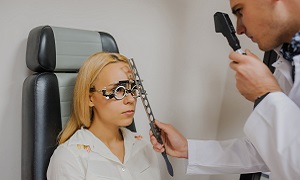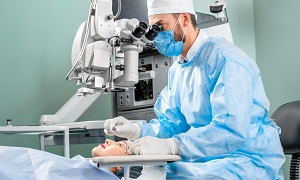Best Doctors in India for Keratoconus Treatment
- Opthalmologist, Chennai, India
- Over 26 years’ experience
Profile Highlights:
- Dr. Pratik Ranjan Sen is a specialist in Ophthalmology and serves as an Ophthalmologist – Consultant at Apollo Hospitals, Chennai.
- He has performed over 8000 Retinal detachment and other Vitreo retinal disorder surgeries.
- Dr. Pratik Ranjan Sen considers his profession a mission and is dedicated to his work. Due to this, he has gained enough trust and recommendations from his patients.
- Ophthalmologist, Chennai, India
- Over 21 years’ experience
Profile Highlights:
- Dr. Viswanathan P is one of the best eye surgeons in India having an overall experience of 21 years.
- He is a qualified doctor from the Tamil Nadu University of India and possesses a degree in MBBS and MS.
- One can visit him for routine eye check-ups or retina examinations and services like eye surgery, retina surgery, cataract surgery, etc.
- Ophthalmologist, Gurugram, India
- Over 13 years’ experience
Profile Highlights:
- Dr. Svati Bansal is an esteemed consultant and practitioner of ophthalmology in Gurugram.
- Her specialty lies in orbit and oculoplasty, ocular oncology, ocular trauma, and neuro-ophthalmology.
- She has fellowships in neuro-ophthalmology and ocular motility, oculoplasty, and facial aesthetics, and ocular oculoplastic and ocular oncology.
Best Hospitals in India for Keratoconus Treatment
Pushpawati Singhania Hospital & Research Institute, New Delhi
- City: New Delhi, India
Hospital Highlights:
- Established in 1996, Pushpawati Singhania Research Institute is one of the top hospitals in the NCR region, as well as one of the top facilities in India for gastroenterology. The hospital is one of South Asia’s first institutes in medical and surgical treatment for diseases related to digestion.
- The hospital is equipped with state-of-the art facilities coupled with the latest equipment as well as renowned consultants from various parts of India as well as other parts of the world.
W Pratiksha Hospital, Gurgaon
- City: Gurugram, India
Hospital Highlights:
- W Pratiksha Hospital, Gurugram, is one of the best hospitals in the NCR region. It is also a top hospital in India for IVF. Since its inception, the hospital has performed over 5500 successful IVFs. The hospital also specializes in gynecology.
- With over 20 years of experience in providing quality healthcare, the hospital is known as one of the most trusted and valued health providers in India.
- Equipped with world-class medical facilities and advanced technology, the hospital’s doctors and clinicians also have a track record of delivering excellent results. The hospital is also known for focusing on preventive well-being as much as on curative treatment.
- The hospital has earned the trust of its patients, by providing the best available treatments at affordable costs.
Narayana Superspeciality Hospital, Gurugram
- City: Gurugram, India
Hospital Highlights:
- Situated near DLF Cyber City, Gurugram, Narayana Superspecialty Hospital is one of the top medical facilities in the Delhi NCR region, catering to the needs of the people. Known for its commitment to quality medical care and patient service, the hospital is a state-of-the-art facility with planned and well-equipped sections, which includes a spacious OPD area as well as comfortable patient rooms.
- It is the closest super-specialty hospital from Indira Gandhi International Airport towards Gurugram, and also the nearest super specialty hospital from DLF Cyber City. It is also close to major residential areas in Gurugram.
- It is part of the renowned Narayana Health Group. Established in 2000, by Dr. Devi Shetty, a renowned cardiac surgeon, it has grown to be one fo India’s leading healthcare groups.
Sir Ganga Ram Hospital, New Delhi
- City: New Delhi, India
Hospital Highlights:
- Sir Ganga Ram Hospital, New Delhi is known to provide the latest medical procedures with the latest technology in all of its units.
- The hospital has a team of reputed doctors, nurses, and healthcare professionals that ensure that patients receive quality care at affordable costs.
- Staffed with a team of highly qualified doctors, dedicated nurses, and paramedical and non-medical staff, the hospital aims to lead in healthcare delivery, medical education, training, and research.
- As per the vision of the founder, the hospital also provides free treatment to the economically weaker sections of society.
- Sir Ganga Ram Hospital also provides training to young doctors under the Diplomate in National Board(DNB) program. The DNB program at the hospital was started in 1984 and it is known for currently running the maximum number of DNB specialties in the country. It also has the distinction of having the first bone bank in India.
KIMS Hospital, Hyderabad
- City: Hyderabad, India
Hospital Highlights:
- KIMS Hospital (a brand name of Krishna Institute of Medical Sciences) is one of the largest and best multi-speciality hospitals in Hyderabad. The hospital provides various treatments to an enormous number of patients.
- The hospital has a capacity of more than 3000 beds. KIMS Hospitals offers different healthcare services in more than 25 specialities and super specialities.
- The hospital is equipped with modern medical equipment and technology. It has robotic equipment to provide minimal invasive techniques for patients.
- The hospital is aimed at providing world-class healthcare facilities and services at an affordable cost for patients.
- The various specialities and departments of the hospital include neurosciences, gastroenterology & hepatology, robotic science, reproductive sciences, dental science, oncological sciences, organ transplantation, heart and lung transplantation and mother and child care.
Fortis Hospital, Shalimar Bagh
- City: New Delhi, India
Hospital Highlights:
- Fortis Hospital in Shalimar Bagh is a multi-super specialty hospital that strives to provide world-class patient care by leaving no stone unturned.
- Fortis, Shalimar Bagh, with 262 beds and a 7.34-acre footprint, provides the best level of medical care through its team of doctors, nurses, technicians, and management professionals.
Reliance Hospital, Mumbai
- City: Mumbai, India
Hospital Highlights:
- Reliance Hospital is one of the best super-specialty care hospitals in Navi Mumbai.
- The main purpose of this hospital is to become a trustworthy place for the best health and hope for society. The hospital is well connected to the suburbs of Mumbai and Navi Mumbai.
- The hospital has various specialty departments, viz., Accident & Emergency, Anesthesiology, Dental Services, Dermatology, Diabetology, Dietetics Nutrition, Endocrinology, ENT, Gastroenterology, General Surgery, Gynaecology And Obstetrics, Hepato Pancreato Biliary Surgery, Infectious Disease, Internal Medicine, Interventional Radiology, Laboratory Medicine, Minimal Access Laparoscopic Surgery, Nephrology, Neurosciences, Opthalmology, Orthopaedics, Paediatrics, Pain Management Palliative Care, Physical Medicine Rehabilitation, Plastic And Reconstructive Surgery, Psychiatry, Pulmonary Medicine, Radiology, Rheumatology, Transplant, Urology Andrology, Vascular Surgery
Lilavati Hospital & Research Centre, Mumbai
- City: Mumbai, India
Hospital Highlights:
- Lilavati Hospital & Research Centre is India’s premier multi-speciality tertiary care hospital and has been recognised as a global medical excellence centre.
- Lilavati Hospital & Research Centre has built an unrivalled level of trust with its patients over the years, thanks to a solid foundation that comprises cutting-edge facilities, the best medical competence, research, education, and charity endeavours.
- The hospital is quite proud of the fact that it now serves patients from all kinds of backgrounds, not just from the United States but from all around the world.
- The hospital has a total of 323 beds, one of the largest Intensive Care Units (ICUs), 12 Operation Theatres with modern amenities, over 300 consultants, and almost 1,800 personnel.
Venkateshwar Hospital, Dwarka, New Delhi
- City: New Delhi, India
Hospital Highlights:
- State-of-the-art technology and devoted healthcare professionals have been brought together under one roof at Venkateshwar Hospital to provide genuine medical care. The hospital’s professionals work together as a team to deliver the best possible treatment to their patients, using the most sophisticated equipment and information technology.
- Venkateshwar Hospital’s mission is to attain global excellence in healthcare by employing evidence-based, ethical clinical practices and cutting-edge technology by a team of highly skilled experts.
Keratoconus
Keratoconus is a condition which occurs when your cornea, the clear, dome-shaped front surface of your eyes; thins gradually and starts bulging outward into a cone shape. The tiny fibers of protein in your eye which is known as collagen help in holding your cornea in place. When these fibers are weakened, they are unable to hold their shape. The cornea, therefore, gets more and more cone-like. The condition is caused when you don’t have enough protective antioxidants in the cornea.
In the early stages of this condition, you can use glasses or soft contact lenses. But if your condition becomes advanced, you might need a cornea transplant.
Symptoms
Signs and symptoms of this condition can change as the condition progresses. They include the following:
- Blurred or distorted vision
- Increased sensitivity to bright light and glare, and this can lead to problems with driving at night
- Needing to change eyeglass prescriptions frequently
- Sudden worsening or clouding of vision
See your eye doctor or ophthalmologist, if you feel your eyesight is worsening rapidly. Your doctor will conduct a routine eye exam, and he/she will look for signs of keratoconus.
Causes & risk factors
What exactly causes this condition is unknown, though genetic and environmental factors are generally considered to be involved. Around 1 in 10 people also have a parent with this condition.
These factors can also increase your chances of developing this condition:
- Rubbing your eyes vigorously
- Having a family history of keratoconus
- Having certain conditions, which can include Down syndrome, retinitis pigmentosa, Ehlers-Danlos syndrome, hay fever and asthma
Diagnosis
For the diagnosis of keratoconus, your ophthalmologist will review your medical and family history after which he/she will conduct an eye exam. He/she might conduct other tests to determine more details regarding the shape of your cornea. Tests to diagnose keratoconus include:
Eye refraction
In this method, your eye doctor makes the use of special equipment that measures your eyes and checks for any vision problems. He/ she may ask you to look through a device containing wheels of different lenses to help judge which combination is able to give you the sharpest vision. Some doctors might also use a hand-held instrument in order to evaluate your eyes.
Keratometry
This test involves your doctor focusing a circle of light on the cornea and measuring the reflection in order to determine the basic shape of your cornea.
Slit-lamp examination
This test involves your doctor directing a vertical beam of light on the surface of your eye. Next, she will use a low-powered microscope to view your eye. He/she will evaluate the shape of your cornea and looks for other potential problems in your eye.
Computerized corneal mapping
Special photographic tests, including corneal tomography and corneal topography, can be used to record images to create a detailed shape map of your cornea. Corneal tomography can also be used to measure the thickness of your cornea. Corneal tomography can often detect early signs of keratoconus before this disease is visible by slit-lamp examination.
Treatment
In most cases, you will probably receive new glasses, especially if your case is mild. If mild eyeglasses don’t clear things up for you, your doctor might suggest contact lenses. Over time, other treatments will also be required to strengthen your cornea and improve your eyesight.
A treatment which is known as cornea collagen crosslinking might stop the condition from getting worse. Your doctor might also implant a ring known as an Intact under the cornea’s surface. This can help to flatten the shape of the cone and improve the vision.
Surgery
Penetrating keratoplasty
If you are having corneal scarring or extreme thinning, you will likely require a cornea transplant or a keratoplasty. In this procedure, doctors are going to remove a full-thickness portion of your central cornea. This is then going to be replaced with donor tissue.
Deep anterior lamellar keratoplasty (DALK)
This procedure helps to preserve the inside lining of the cornea or the endothelium. This can help one in avoiding the rejection of this critical inside lining that may occur if a full-thickness transplant is performed.














